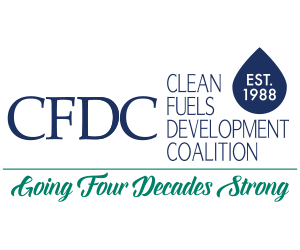For Immediate Release:
Washington, D.C., March 18, 2020: The widespread introduction of electric vehicles (EVs) as a means of reducing carbon emissions presents a far greater challenge than the public is being led to believe, according to new research by the Clean Fuels Development Coalition (CFDC).
This conclusion is presented in Reality EV, a new Issue Brief released here this week.
Reality EV’s research explains the consumer/taxpayer, infrastructure, and environmental constraints single fuel source EVs must overcome to live up to their often-claimed perfect solution. In addition, it is estimated that a $1-2 trillion dollar government/taxpayer investment is needed for EVs to replace 50% of the consumer fleet in three decades.
Issue Brief principal author Burl Haigwood of CFDC said this research is not intended to dismiss the potential contribution of EVs but rather to put them in perspective. In doing so it makes it critical to recognize the role biofuels can play to provide much more immediate and quantifiable benefits.
“We built our research in part off of an extensive study by the Massachusetts Institute of Technology (MIT),” said Mr. Haigwood. “Even MITs most optimistic projection of 50% market penetration by EVs in 30 years recognized that hundreds of millions of conventional vehicles will be produced during that time. Their study clearly stated that in climate terms, improved efficiency of gasoline cars was as critical as electrification.”
There are 270 million light duty vehicles registered in the U.S., with 15 million or more new cars sold every year. These cars have an average 17-year life span, meaning gasoline will remain the primary form of propulsion. Mr. Haigwood notes that gasoline continues to contain increasing amounts of benzene and other toxics that are not only carbon intensive but present a significant threat to public health.
“We have an opportunity to increase octane with the pending Safer Affordable Fuel-Efficient (SAFE) Vehicles Rule which would allow conventional vehicles to reduce carbon emissions on a par with EVs when all the external factors are considered. Higher blends of ethanol provide a less costly, cleaner source of octane that can reduce carbon not just from a climate perspective but address these overlooked health risks from gasoline.”
Public officials ranging from Republican Senator Charles Grassley to former Democratic Senator Tim Wirth have urged environmentalists to look at the benefits of 30% ethanol blends.
“EVs will without question should be a key part of our transportation mix but the reality of cost, consumer choice, re-charging, and many other factors indicates we need to make sure biofuels remain part of the mix,” said Haigwood.
Copies of the Issue Brief can be downloaded here. For more information please visit the Safe Gasoline Campaign or contact Doug Durante, Executive Director, CFDC at doug.durante@cleanfuelsdc.org
